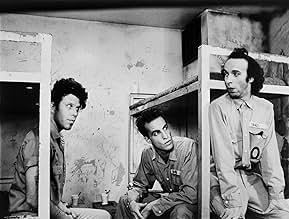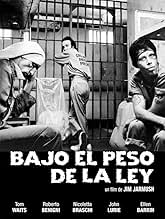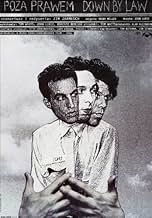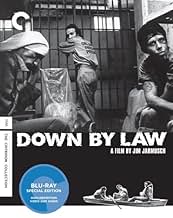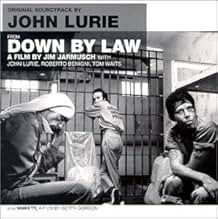VALUTAZIONE IMDb
7,6/10
57.276
LA TUA VALUTAZIONE
Due persone innocenti vengono arrestate. Una terza persona con un inglese rotto, li raggiunge nella loro cella. Su sua idea, decidono di fuggire dalla prigione. Il loro viaggio è il resto de... Leggi tuttoDue persone innocenti vengono arrestate. Una terza persona con un inglese rotto, li raggiunge nella loro cella. Su sua idea, decidono di fuggire dalla prigione. Il loro viaggio è il resto del film.Due persone innocenti vengono arrestate. Una terza persona con un inglese rotto, li raggiunge nella loro cella. Su sua idea, decidono di fuggire dalla prigione. Il loro viaggio è il resto del film.
- Regia
- Sceneggiatura
- Star
- Premi
- 4 vittorie e 6 candidature totali
Joy N. Houck Jr.
- Detective Mandino
- (as Joy Houck Jr.)
Recensioni in evidenza
This may very well be a mans' journey film, actually literally, but philosophically, it's still one that serves to be a reminder of all of the things in life and about how our choices eventually need to come to a head. The three lead actors are very naturalistic, except Benigni who seems to overdo it at times. The writing and the directing are typical Jarmusch, and we are able to experience just what he is feeling in every frame. So typical that audiences themselves will be wondering what is going on, and seeing as how it's plot less besides the obvious already in the summary, only Jarmusch fans who know what they're getting into will not be surprised by its narrative. If anything, it's one of his plottier films.
Wow, what a movie. Far away from Hollywood, Jim Jarmusch creates a world where you don't need drama, pathos and action to fascinate the watcher. Because fascinating is exactly what this movie is. A plot in the classical sense is almost completely missing; the scenes, in their simplicity sometimes reminding of theater, follow each other without ever creating real suspense; neither griping action nor complex dialogues are there to excite the spectator. And still, with ease Jarmusch fills more than a hundred minutes with a story you won't take your eyes off. It is hard to tell what the atmosphere of the movie is really based on, the characters, the setting, entirely in black and white, the music - probably all of it. Again, like in Jarmusch's later movie "Dead man", speed is an important factor: everything moves slowly, without haste, as there is no dramatic climax you could hurry towards; yet, boring is a word that certainly doesn't fit this piece of cineastic art. On the other hand, though some of the scenes seem quite surrealistic, it is not a really artistic movie breaking with all the traditional concepts of filmmaking; it is more a movie in classic shape with an unconventional story, not trying to shock, to confuse or even to make you think so much; this movie doesn't need all this to get your complete attention. You could probably speculate a lot about the meaning of the movie; to me, this seems highly unnecessary. Just let it unfold its atmosphere. Judge yourselves, but I was excited in a very special way by every scene of this motion picture, giving me one of my best cineastic experiences of the recent time.
I've been binging Jarmusch's filmography this week for the first-time knowing little about his films and style of storytelling. In my opinion, this is his greatest achievement. The cinematography is beautiful; all of the river-boating scenes looked incredible. The performances are all great, especially Benigni's who had me in tears from laughter. The pacing is also solid; how these three very different men form a bond is a marvel to experience. On the whole, the story is a unique take on the 'prison film' and operates in that perfect balance of quirky and realistic. If you're like me and you're ripping through Jarmusch films for the first time, I'd say this is a pretty great introduction to the man and his mind.
A prison film without an overt sense of morality? That comes as no surprise from Jim Jarmusch. One of the pioneers of independent filmmaking in the 1980s, Jarmusch cares little for plot or crafting a message for his audience and much more about drawing up scenarios for his characters that reveal nuances of the human condition.
"Down by Law" features three men in New Orleans who are guilty of their crimes though wrongfully imprisoned. Zack (Tom Waits) is a radio DJ who — after being thrown out by his girlfriend — agrees to a shady odd job driving a car that sets him up to take a fall. Jack (John Lurie) is a local pimp who ends up the victim of a sting operation. Both men feel unfairly hit just for letting their guard down. In prison they meet Bob (Roberto Benigni), an optimistic and overly friendly Italian immigrant with a similar story. The three men connect within confinement, but that bond is tested in new ways after they escape.
Aside from Zack and Jack's arrests, Jarmusch takes his laid back approach to most of the events in the film, choosing to show only the aftereffects of the major plot points that most filmmakers would want to depict on screen. He did the same thing in "Stranger Than Paradise" a couple years earlier, wanting to focus his film on how the characters respond to swings of fortune. The prison break, for example, is not explained. We only see the before followed by a cut to the three prisoners on the run.
Zack, Jack and Bob make for an interesting trio, particularly Bob. Benigni brings impeccable spirit and joviality to break up the somewhat slogging animosity between carefree cool guy Zack (Waits is spot-on casting) and the self-righteous, sarcastic Jack (deployed similarly to the way he was in "Stranger Than Paradise"). Benigni is specifically responsible for a couple of the film's best moments, one an ice cream protest and the other involving a rabbit. His comedy brings a dimension and energy to this film that "Paradise" was missing, and it fits within Jarmusch's style and framework.
"Down by Law" also feels more cinematic. Jarmusch includes more of the New Orleans setting and the Louisiana wilderness with dollying/trucking shots that help immerse his very intimate stories in something larger, in this case the lawlessness of NOLA and the swampland. Maybe Jarmusch doesn't have a neatly wrapped up moral to send us home with, his film clearly establishes a belief in an unpredictability to our world. And given the way his characters handle it, you can tell that he views humans as people who are eternally torn between self-interest and companionship.
Jarmusch's early work shows great vision of how he wants to tell stories, with less emphasis on what those stories are trying to say. It's as though he's running experiments with his characters, and what plays out in his films are the results. Fans of art films and theatre will surely appreciate these early offerings, while those who prefer a director take them on a ride rather than present them an experiment to observe will have trouble connecting.
~Steven C
Thanks for reading! Visit Movie Muse Reviews for more
"Down by Law" features three men in New Orleans who are guilty of their crimes though wrongfully imprisoned. Zack (Tom Waits) is a radio DJ who — after being thrown out by his girlfriend — agrees to a shady odd job driving a car that sets him up to take a fall. Jack (John Lurie) is a local pimp who ends up the victim of a sting operation. Both men feel unfairly hit just for letting their guard down. In prison they meet Bob (Roberto Benigni), an optimistic and overly friendly Italian immigrant with a similar story. The three men connect within confinement, but that bond is tested in new ways after they escape.
Aside from Zack and Jack's arrests, Jarmusch takes his laid back approach to most of the events in the film, choosing to show only the aftereffects of the major plot points that most filmmakers would want to depict on screen. He did the same thing in "Stranger Than Paradise" a couple years earlier, wanting to focus his film on how the characters respond to swings of fortune. The prison break, for example, is not explained. We only see the before followed by a cut to the three prisoners on the run.
Zack, Jack and Bob make for an interesting trio, particularly Bob. Benigni brings impeccable spirit and joviality to break up the somewhat slogging animosity between carefree cool guy Zack (Waits is spot-on casting) and the self-righteous, sarcastic Jack (deployed similarly to the way he was in "Stranger Than Paradise"). Benigni is specifically responsible for a couple of the film's best moments, one an ice cream protest and the other involving a rabbit. His comedy brings a dimension and energy to this film that "Paradise" was missing, and it fits within Jarmusch's style and framework.
"Down by Law" also feels more cinematic. Jarmusch includes more of the New Orleans setting and the Louisiana wilderness with dollying/trucking shots that help immerse his very intimate stories in something larger, in this case the lawlessness of NOLA and the swampland. Maybe Jarmusch doesn't have a neatly wrapped up moral to send us home with, his film clearly establishes a belief in an unpredictability to our world. And given the way his characters handle it, you can tell that he views humans as people who are eternally torn between self-interest and companionship.
Jarmusch's early work shows great vision of how he wants to tell stories, with less emphasis on what those stories are trying to say. It's as though he's running experiments with his characters, and what plays out in his films are the results. Fans of art films and theatre will surely appreciate these early offerings, while those who prefer a director take them on a ride rather than present them an experiment to observe will have trouble connecting.
~Steven C
Thanks for reading! Visit Movie Muse Reviews for more
The story of three different men (Tom Waits, John Lurie, and Roberto Benigni) in a Louisiana prison and their eventual journey.
This film is a natural progression from "Stranger Than Paradise". Lurie returns as a lead, and the music of Screamin' Jay Hawkins is replaced with Tom Waits. If Hawkins and Waits know each other, I have no idea, but their music styles are not far removed.
Although Waits is among my favorite actors (he excels at playing villains), the standout performance here is Benigni. How much English he knew at the time I am not sure, but he brings a comic mischief to the film, and is the most light-hearted despite being potentially the most dangerous.
This film is a natural progression from "Stranger Than Paradise". Lurie returns as a lead, and the music of Screamin' Jay Hawkins is replaced with Tom Waits. If Hawkins and Waits know each other, I have no idea, but their music styles are not far removed.
Although Waits is among my favorite actors (he excels at playing villains), the standout performance here is Benigni. How much English he knew at the time I am not sure, but he brings a comic mischief to the film, and is the most light-hearted despite being potentially the most dangerous.
Lo sapevi?
- QuizRoberto Benigni's rabbit soliloquy was almost entirely self-written/improvisation, based on his own life experiences. His mother actually did raise rabbits.
- BlooperZack writes the number of the days he's spent in the cellar on the wall. Before he fights Jack for the first time, he angrily scribes two big lines (two days). In the next scene with Roberto, they are normal length.
- Colonne sonoreJockey Full of Bourbon
Written and Performed by Tom Waits
from his 'Rain Dogs' album
Courtesy Island Records, Inc.
(opening title)
I più visti
Accedi per valutare e creare un elenco di titoli salvati per ottenere consigli personalizzati
- How long is Down by Law?Powered by Alexa
Dettagli
- Data di uscita
- Paesi di origine
- Lingue
- Celebre anche come
- Down by Law
- Luoghi delle riprese
- Aziende produttrici
- Vedi altri crediti dell’azienda su IMDbPro
Botteghino
- Budget
- 1.100.000 USD (previsto)
- Lordo Stati Uniti e Canada
- 1.435.668 USD
- Lordo in tutto il mondo
- 1.529.199 USD
- Tempo di esecuzione1 ora 47 minuti
- Colore
- Mix di suoni
- Proporzioni
- 1.85 : 1
Contribuisci a questa pagina
Suggerisci una modifica o aggiungi i contenuti mancanti



![Down by Law: The Criterion Collection [Blu-Ray]](https://m.media-amazon.com/images/M/MV5BMzk0ZDZhYmItNGNhYS00ZWI1LTg0OTYtMDdjOWNkODBlNTYzXkEyXkFqcGdeQXVyNzU1NzE3NTg@._V1_QL75_UX500_CR0)


